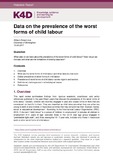| dc.contributor.author | Avis, William | |
| dc.date.accessioned | 2017-07-06T14:39:29Z | |
| dc.date.available | 2017-07-06T14:39:29Z | |
| dc.date.issued | 2017-04-13 | |
| dc.identifier.citation | Avis, W. (2017). Data on the prevalence of the worst forms of child labour. K4D Helpdesk Report. Brighton, UK: Institute of Development Studies | en |
| dc.identifier.uri | https://opendocs.ids.ac.uk/opendocs/handle/20.500.12413/13067 | |
| dc.description.abstract | This rapid review synthesises findings from rigorous academic, practitioner, and policy references published in the past fifteen years that discuss the prevalence of the worst forms of child labour. Globally, children are routinely engaged in paid and unpaid forms of work that are considered not harmful to them. They are classified as child labourers when they are either too young to work or are involved in hazardous activities that may compromise their physical, mental, social or educational development . According to the International Labour Organisation (IPEC, 2013: 7) the term “child labour” is a subset of “children in employment”, it includes all children in employment 5-11 years of age; excludes those in the 12-14 year age group engaged in “permissible light work”; and, from among the 15-17-year-olds, includes only those in hazardous work or other worst forms of child labour. | en |
| dc.language.iso | en | en |
| dc.publisher | Institute of Development Studies | en |
| dc.relation.ispartofseries | K4D Helpdesk reports; | |
| dc.rights.uri | https://www.nationalarchives.gov.uk/doc/open-government-licence/version/3/ | en |
| dc.subject | Children and Youth | en |
| dc.subject | Livelihoods | en |
| dc.subject | Social Development | en |
| dc.title | Data on the Prevalence of the Worst Forms of child Labour | en |
| dc.type | Helpdesk | en |
| dc.rights.holder | DFID | en |
| dcterms.dateAccepted | 2017-04-13 | |
| rioxxterms.funder | Default funder | en |
| rioxxterms.identifier.project | K4D | en |
| rioxxterms.version | NA | en |
| rioxxterms.funder.project | 0986883a-6d0f-4bb8-9c46-5e0682934d65 | en |

